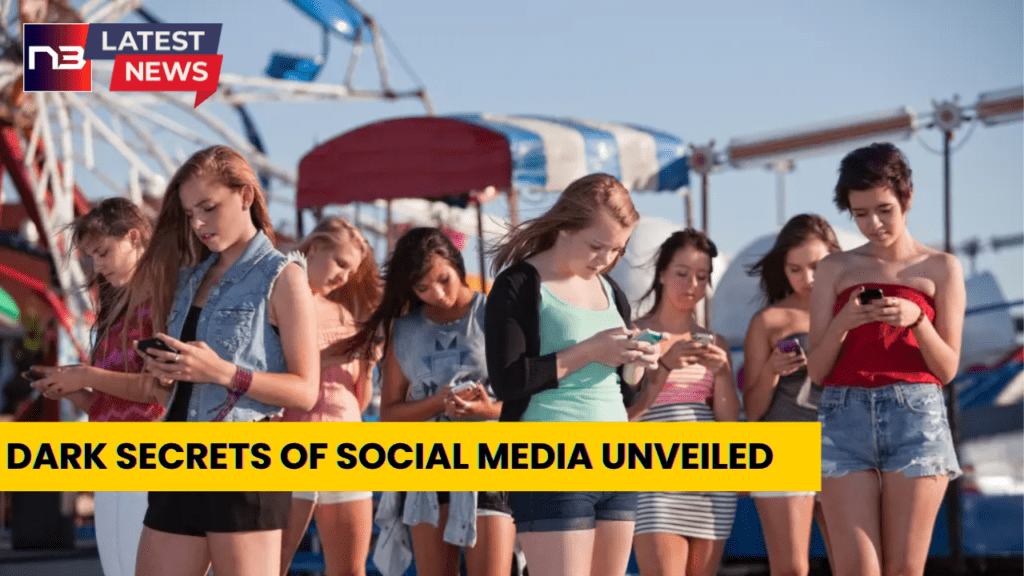Are you ready to confront the unsettling truth about the mental health crisis among our nation’s teens? Brace yourself for a shocking revelation that will leave you questioning the very fabric of our society. Prepare to dive into a disturbing world where social media reigns supreme, wreaking havoc on our youth and shattering their once-bright futures.
In a staggering twist of fate, depression and hopelessness have gripped American teenagers with unprecedented force, transforming their lives into a nightmarish battleground of inner turmoil. The University of Michigan’s annual poll, surveying over 50,000 students in 8th, 10th, and 12th grades nationwide, has uncovered an alarming truth: the number of teens grappling with sentiments such as “I can’t do anything right,” “I do not enjoy life,” and “My life is not useful” has skyrocketed, doubling in just a decade.


Dr. Jean Twenge, a renowned psychologist and generational expert, reveals that social media is the primary culprit behind this harrowing surge. In her groundbreaking book, “Generations: The Real Differences Between Gen Z, Millennials, Gen X, Boomers and Silents — and What They Mean for America’s Future,” Twenge unveils the stark reality of the negative impact of social media and screen time on teen mental health. According to Twenge, the mass adoption of smartphones since the early 2010s has triggered a seismic shift in the emotional well-being of adolescents.
As platforms like Instagram, Snapchat, and TikTok continue to dominate the lives of our youth, their psychological landscape has morphed into a desolate wasteland of comparison, isolation, and incessant pursuit of validation. Teens, entranced by the allure of virtual connections, are now spending up to nine hours a day glued to screens, relinquishing precious moments of personal growth and authentic human interaction. The consequences are dire: fewer teens are engaging in traditional rites of passage, such as dating, driving, and part-time employment, as screen time replaces these critical experiences.


Psychologist Twenge asserts that this dangerous cocktail of excessive screen time, dwindling face-to-face friendships, and inadequate sleep is a recipe for mental health disaster. Surgeon General Vivek Murthy’s warning about the surge in teen depression and suicide echoes Twenge’s concerns. However, it is our young girls who bear the brunt of this crisis, exacerbated by platforms like Instagram, which fuel their insidious tendency to compare themselves and vie for social status through followers and likes.
Although the COVID-19 pandemic has further exacerbated the mental health challenges faced by Gen Z, Twenge emphasizes that the crisis predates the global health emergency. An era of political polarization, cancel culture, and social unrest has instilled a deep sense of hopelessness and cynicism among our youth, leaving them disillusioned about the future and doubtful of their country’s values. The economic climate further compounds their distress, as older Gen Zers reluctantly move back in with their parents, feeling trapped in a cycle of despair.
The consequences of this spiraling depression epidemic are truly devastating. A shocking statistic reveals that nearly one-third of teen girls have seriously contemplated suicide, while youth self-harm hospitalizations have skyrocketed by a heart-wrenching 163% over the past decade. Suicide now ranks as the second-leading cause of death among young Americans, casting a dark shadow over their prospects and dreams. Twenge warns that while parents should delay their children’s exposure to smartphones and social media, bolder actions are required, such as raising the minimum age for social media to 16.
The mental health crisis ravaging America’s teens demands urgent attention and action. The rise of social media has thrust our youth into an abyss of despair, where comparison, isolation, and distorted reality consume their lives. It is imperative that we collectively acknowledge this group-level problem and explore innovative solutions to safeguard the well-being and future of our nation’s most precious resource.
The time for complacency is over. We must confront the grim reality of a generation teetering on the edge of darkness. Let us unite in the fight against this silent epidemic, ensuring that our teens regain their hope, joy, and zest for life. Together, we can chart a brighter path for future generations.



